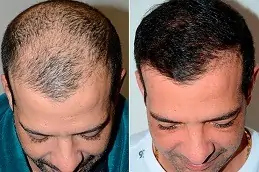Exploring Finasteride as a Hair Loss Treatment
- Huda Batool
- Dec 20, 2024
- 4 min read
Hair loss is a common concern for both men and women, with many seeking effective solutions to restore their hair. Among the various treatments available, Finasteride for Hair Loss Dubai stands out as a popular option for treating male pattern baldness and, in some cases, female hair loss. This article explores Finasteride as a hair loss treatment, its benefits, potential side effects, and its effectiveness.
What is Finasteride?
Finasteride is a medication primarily used to treat androgenic alopecia, also known as male pattern baldness. It works by inhibiting the conversion of testosterone into dihydrotestosterone (DHT), a hormone that plays a key role in hair thinning and hair loss. By lowering DHT levels, Finasteride helps to reduce hair follicle shrinkage and can even promote hair regrowth.
The medication is available in tablet form and is commonly sold under the brand names Propecia (for hair loss) and Proscar (for enlarged prostate). While Propecia is prescribed for hair loss treatment, Proscar is often used to treat benign prostatic hyperplasia (BPH), a condition involving an enlarged prostate.
How Does Finasteride Work?
Finasteride works by targeting DHT, a potent androgen hormone. DHT binds to androgen receptors in the scalp, causing hair follicles to shrink over time. As a result, the affected follicles produce finer, shorter hair, eventually leading to hair loss. By blocking the enzyme 5-alpha reductase, which is responsible for converting testosterone into DHT, Finasteride reduces DHT levels in the scalp, allowing the hair follicles to remain healthy and functional.
This action helps to slow down hair loss, promote hair regrowth, and maintain the existing hair on the scalp. It is particularly effective in treating vertex (crown) baldness and receding hairlines, two common areas affected by male pattern baldness.

Effectiveness of Finasteride
Finasteride has been shown to be effective in treating hair loss, with several studies and clinical trials supporting its use. In clinical trials, approximately 80% of men who used Finasteride experienced either slowed hair loss or some degree of hair regrowth. The results are typically seen after 3 to 6 months of consistent use, with maximum results occurring after 12 months.
However, the effectiveness of Finasteride can vary from person to person, and not all individuals respond the same way. Men with early-stage hair loss tend to benefit the most from Finasteride, while those with advanced hair loss may see less noticeable results.
Benefits of Finasteride
Proven Hair Regrowth: Many users experience visible hair regrowth, particularly in the crown area. Over time, Finasteride can restore thicker and fuller hair.
Prevention of Further Hair Loss: One of the primary benefits of Finasteride is its ability to prevent further hair loss. For men experiencing early-stage baldness, it can halt the progression of hair thinning.
Non-invasive: Unlike hair transplants or other surgical treatments, Finasteride is a non-invasive solution, making it an attractive option for those seeking an easy, at-home treatment.
Convenience: Finasteride is taken in pill form once a day, which makes it easy to incorporate into a daily routine without the need for complicated procedures or frequent visits to a clinic.
FDA-Approved: Finasteride is FDA-approved for the treatment of male pattern baldness, ensuring its safety and effectiveness when used as directed.
Side Effects of Finasteride
Despite its benefits, Finasteride is not without its potential side effects. While many users tolerate the medication well, some may experience side effects, which can range from mild to more severe. It is important to weigh the risks against the benefits before starting treatment.
Sexual Side Effects: The most commonly reported side effects of Finasteride are related to sexual health. These can include decreased libido, erectile dysfunction, and ejaculation problems. While these side effects are often reversible after discontinuing the medication, they can be a cause for concern for some users.
Hormonal Imbalance: Finasteride can interfere with hormone levels, leading to breast tenderness, gynecomastia (enlarged breasts in men), and decreased semen volume in some users.
Mood Changes: Some men have reported experiencing depression, anxiety, or other mood-related side effects while using Finasteride. These side effects are less common but should be monitored, especially in individuals with a history of mental health issues.
Other Side Effects: Less common side effects include rash, swelling in the face or lips, and testicular pain. If any of these symptoms occur, users should seek medical attention immediately.
Should You Consider Finasteride?
Before starting Finasteride for Hair Loss in Dubai, it's crucial to consult with a healthcare professional to determine whether it is the right treatment for your hair loss. While the medication can be highly effective, it is not suitable for everyone. People with certain health conditions, such as liver disease or a history of prostate cancer, may not be good candidates for Finasteride.
It's also essential to keep in mind that Finasteride requires long-term commitment to maintain results. If the medication is discontinued, hair loss may resume within a few months.
For women, Finasteride is generally not recommended due to the potential risk of birth defects. However, in certain cases, a doctor may prescribe it off-label for female hair loss, particularly in postmenopausal women.
Conclusion
Finasteride offers a promising solution for those struggling with hair loss, particularly men experiencing male pattern baldness. Its ability to slow hair loss and promote regrowth makes it a popular choice for many. However, like any medication, it comes with potential side effects that should be considered before starting treatment. Consulting with a healthcare professional can help determine if Finasteride is the right option based on individual needs and medical history. Whether used alone or in combination with other treatments, Finasteride remains one of the most widely used and researched treatments for hair loss today.








Comments